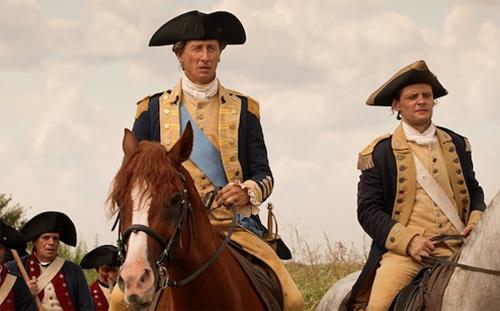
The History channel is taking the occasion of George Washington's 288th birthday to remind us that the Father of Our Country wasn't always the perfect American.
Washington, a three-night miniseries that launches Sunday at 8 p.m. ET on History, tells Washington's story through the channel's standard technique of re-created drama.
Unfamiliar actors play out critical scenes from Washington's life, with voiceover and transitions provided by Jeff Daniels.
While the dramatic results can feel stilted, they do provide a 3-D visual for the narration.
Daniels lays out the premise upfront: that most Americans today know Washington as a statue and, for those who still use paper money, the face of the dollar bill.
They know he commanded the Continental Army that won the Revolutionary War. They know that after the war ended, he was the consensus choice to become the new country's first president. He served two terms, bringing a sense of stability to an infant nation that had to figure out almost everything on the fly.
As life achievements go, those aren't bad, and Washington gives its subject full credit for both.
As a general, Washington turned a ragged batch of undisciplined militiamen into enough of an army to outlast the British. Without that galvanizing leader, it is widely agreed, the British would have quelled this rebellion as they quelled others around the globe.
But Washington's life was not all lived in triumph or even admirable glory, and this miniseries argues that he can't be fully understood without also acknowledging his flaws and his human side.
The series calls on several historians as well as former President Bill Clinton and former Secretary of State Colin Powell to make that point.
Washington was born into second-tier Virginia gentry and lost his father when he was 11. His mother kept the family tobacco plantation going, an unusual achievement for a woman in those days, and by the time young George was 17, he was raising money and buying land.
In Virginia, at the time, that also meant buying and selling slaves since land was worthless without the labor to sow and harvest the crops.
He would eventually marry a wealthy widow, Martha Custis, and by the time he died, he had expanded his family estate, Mount Vernon, from 2,000 to more than 8,000 acres. His slaveholding, accordingly, also grew.
His career ambition, however, was military. By the time he turned 22, he wanted to become an officer in the British army – a position not available to colonists.
Still, he was given a command and an assignment: Go to the Western Pennsylvania wilderness – what today is Pittsburgh – and talk the French into leaving the strategic fort there, thus resolving an awkward situation with Britain, France, and Native American tribes.
Things did not go well. The Father of Our Country made serious rookie mistakes that left things a mess and came within a few minutes of getting himself and his entire company killed.
Alive only through unexpected mercy from the French and their Native American allies, Washington wrote a report that was essentially a total fabrication, a pack of lies that made it sound like he had accomplished his mission rather than almost getting wiped out and then surrendering. Which is what he really did.
Proving again that marketing is everything, Washington successfully branded himself a triumphant hero.
He got better at soldiering and leading over the next few years, which won him the command of the Continental Army.
This prize was dangerous and dubious, but by then, he was all-in for throwing his former employers out of town. His faith in the rebels' cause never flagged.
Washington comes off in this miniseries as ambitious and calculating. He was also a patriot willing to risk his life for his country, and Daniels' narration argues, strongly, that he learned as he lived.
Since most of the other founding fathers were equally complicated, Washington was, in some ways, the great compromise, the man who drew the least disagreement.
Washington won't tell history scholars much that they didn't know. For the rest of us, it's a good reminder that even the best-branded of our leaders had a more nuanced side.